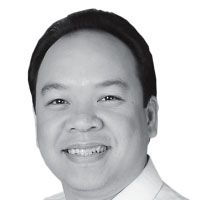To serve and protect … your own

The indictment of the Ninja cops for drug recycling capped a nightmare Kong Hei Fat Choy for our Philippine National Police. No less than President Rodrigo Roa Duterte called out his “ugok” PNP for procuring traffic radar guns at P950,000 a pop when they cost only P10,000 each in Davao. There has been no let up on the Lacson inquiry on the billion-peso deal for 60,000 9mm pistols which stewed at the PNP even pre-PRRD. Southern Police District Brig. Gen. Nolasco Bathan’s high handed confiscation of a news reporter’s camera phone was so publicly umasked after his repeated denials. Now comes the Sandiganbayan’s dismissal of the charges against former PNP Director General Alan Purisima and former Special Action Force (SAF) head, Getulio Napenas for their involvement in the Mamasapano massacre. And it’s only January. What a welcome for new PNP Chief, the Ateneo educated Atty. Archie Gamboa.
Bellwether, once again, is Senate Blue Ribbon chair Richard Gordon who is utterly “devastated” by the Sandiganbayan decision, the same with Albayalde’s indictment last year, for graft only, by the Department of Justice. Opposition stalwart and former Justice Secretary, Sen. Frank Drilon is actually at peace with Albayalde’s indictment. Though Sen. Gordon called it a mere “slap on the wrist,” to Sen. Drilon, better this than a “slap on the face.”
Blindsided. Re: Purisima and Napenas, Sen. Gordon labels the dismissal as “one of the greatest injustices of our time.” The Sandiganbayan verdict does not actually clear Purisima and Napeñas. Yes, it is a dismissal but one without prejudice to the filing of the correct charges. The decision split the special division, 3-2. There is something there but they say its not graft (since there was no allegation of “consideration” exchanging hands for exercising undue influence) nor is it usurpation of authority. Nonetheless, the message for now is that someone got away with it.
The Senate invested heavily in the Mamasapano and the Ninja cops drug recycling embarrassment. Much as Sen. Gordon is inclined to respect separation of powers, he is not about to let sleeping dogs lie. He has already announced the intention to reopen the Mamasapano investigation. Included as object of his expressed displeasure are prosecutorial shortcomings against the PNP. Gordon, eminent UP law alumni, also chairs the Senate justice committee. Look out, Senator, here comes another graft case against another PNP Chief. At least, this complaint for graft will surely allege the crucial element of “consideration.” Per retired PNP General Rudy Lacadin’s Senate testimony, wasn’t he purportedly told that “kaunti lang ang napunta sa akin dyan”?
The massacre of the SAF 44 remains a tragedy calling out for justice. Only the Senate has the courage and the standing in the public eye to speak out when others will not. Already, they are seen as the institution that picked up the mantle for the fallen 44. Justice may be clearly delayed for the SAF heroes but, if the Senate can help it, justice for them will not be denied.
Global governance. World leaders of business, government and civil society gathered this week at Davos, Switzerland for the 50th annual meeting of the World Economic Forum (WEF). The global climate crisis topped the agenda, no doubt driven by high-profile catastrophes such as the Australia, Amazon and California wildfires; record flooding in Jakarta and parts of China; and mega droughts impacting multiple continents. For the first time in the 15-year history of the WEF’s annual Global Risks Report released prior to the Davos conference, climate and environmental issues dominated the top-5 list of highest-likelihood global risks for the next decade: (1) damage from extreme weather events; (2) failure of climate mitigation and adaptation measures; (3) human-caused environmental disasters such as oil spills; (4) mass biodiversity loss; and (5) major natural disasters such as earthquakes and tsunamis.
The Davos speeches of US President Donald Trump and Swedish climate activist Greta Thunberg trended online, highlighting once again the stark contrast between the former’s climate denial and the latter’s plea for urgent action. In his keynote address, Trump said “to embrace the possibilities of tomorrow, we must reject the perennial prophets of doom.” He encouraged the audience to ignore environmental alarmists and their “predictions of the apocalypse.” Greta, on the other hand, demanded for the immediate halt on all fossil fuel exploration, extraction and subsidies, and ended her speech with this challenge to all the conference attendees – “Our house is still on fire. Your inaction is fuelling the flames by the hour. We are still telling you to panic, and to act as if you loved your children above all else.” With these powerful words as backdrop, I requested my brother Macky Maceda, sustainability director of Enderun Colleges, for some insights. This was his reply:
“I asked my students in our Policy and Governance for Sustainability class to share their sentiments. Their reactions were quite sobering. While there was unanimous admiration for Greta, they also felt powerless or ‘too small to have an impact.’ One student felt like a bystander waiting for someone else to come and save the planet and yet pessimistic that it would ever happen. Another said she has decided not to have children in the future because the future looks too bleak to raise a child. When I asked them why they thought the world has not done enough despite all the scientific warnings and clearly-visible climate impacts, the discussion generated sharp tones: (1) leaders of rich nations protect fossil fuel industries out of greed and they will never give it up, (2) people in poorer countries just strive to put food on the table and have no time to worry about climate change, and (3) maybe world leaders would only act if they themselves get struck by a wildfire or other climate-induced catastrophes. The class ended and they left with a deeper understanding of the issues. As a teacher, that was good enough for me.”
- Latest
- Trending
























